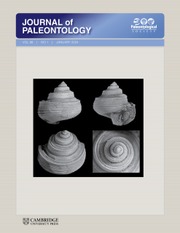Article contents
The Late Devonian brachiopod Cyrtiopsis davidsoni Grabau, 1923, and related forms from central Hunan of South China
Published online by Cambridge University Press: 14 July 2015
Abstract
New specimens representing species of Cyrtiopsis Grabau, 1923, described by Grabau (1931a) were recovered in samples from the Late Devonian deposits of the Changlongjie Member of the Xikuangshan Formation in central Hunan Province of South China. Associated Famennian age conodonts and morphotypes of the rhynchonellid brachiopod Yunnanellina lineage fix the ranges of species of Cyrtiopsis and related taxa in the Xikuangshan Formation within the interval of the Middle triangularis Zone through the Lower crepida Zone (early Famennian) in central Hunan Province.
Detailed study and comparison of external and internal shell structures of the type species of Cyrtiopsis Grabau, 1923, and related species described in Grabau (1931a) shows that Cyrtiopsis from South China includes the type species, C. davidsoni (embodied by the holotype), and C graciosa. Both of these species are shown to lack a delthyrial plate. Grabau's paratypes of C. davidsoni are considered to belong in Cyrtiopsis intermedia Grabau, 1931. The species C. kayseri Grabau, 1931, and C. shensiensis Grabau, 1931, are also deemed synonyms of C. davidsoni Grabau, 1923 (as restricted above). “Cyrtiopsis” intermedia differs from other species of Cyrtiopsis by development of a short delthyrial plate and its systematic position remains uncertain.
The genus Pseudocyrtiopsis is proposed with Cyrtiopsis spiriferoides Grabau, 1931, as the type. Pseudocyrtiopsis new genus is distinguished from Cyrtiopsis Grabau, 1923, by its alate hinge and development of a delthyrial plate. Comparisons of species of Cyrtiopsis from South China with cyrtospiriferid brachiopods identified as Cyrtiopsis by Crickmay (1952) demonstrate that none of the early Famennian species from western Canada can be assigned to the genus as revised here, although C. mimetes Crickmay, 1952, is closely related to “C.” intermedia Grabau, 1931.
- Type
- Research Article
- Information
- Copyright
- Copyright © The Paleontological Society
References
- 8
- Cited by


